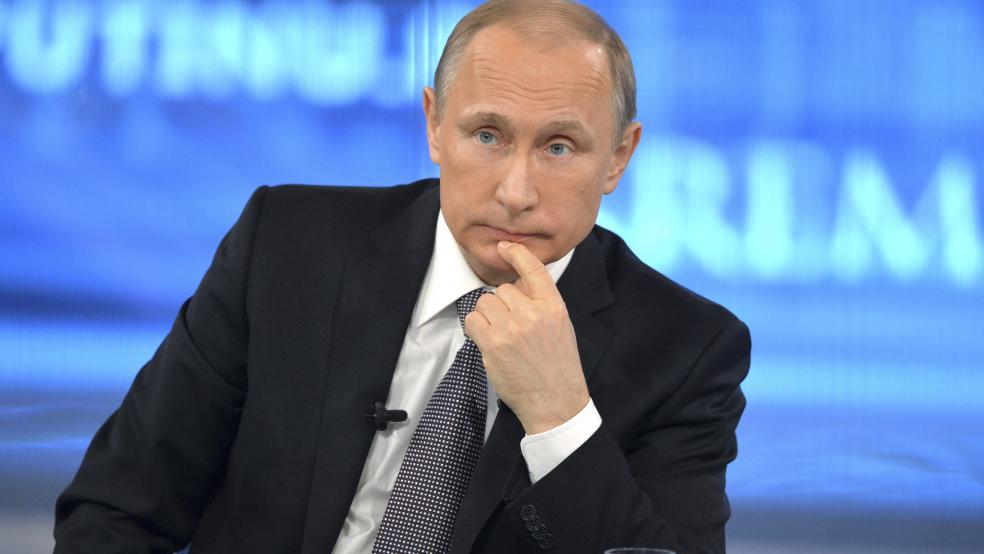Russian officials on Tuesday agreed to restart meetings with the U.S. military in an effort to establish a system that will prevent the two countries’ forces currently fighting in Syria from coming into accidental conflict.
However, the comments of a top Russian political figure, made during a trip to Jordan on Tuesday, suggest that establishing lines of communication between U.S. forces in the area fighting ISIS and Russian forces apparently supporting Syrian dictator Bashar al-Assad may not be enough.
Related: 14 Deadly Weapons Russia Has Sent to Syria
The Kremlin has, in the past week, made several suggestive comments about its willingness to extend its involvement in the Middle East beyond Syrian and into Iraq. On Tuesday, the speaker of the Russian Federation Council, Valentina Matviyenko became the latest to suggest Russia might intervene in Iraq as well.
“In case of an official address from Iraq to the Russian Federation, the leaders of our country would study the political and military expediency of our Air Force’s participation in an air operation. Presently we have not received such an address,” Matviyenko said Tuesday, according to the government-run TASS news agency.
“I want to emphasize that Russia has no other political objectives and no interests other than the defeat of ISIS and that differs us from other nations that participate in another coalition.”
Matviyenko’s comment was not precisely true, as Iraqi officials have publicly said that they would welcome Russian involvement in the fight against ISIS, which could put the Kremlin officials in a bit of a bind if they decide that opening a second front in a new war is more than they want to take on at present.
Related: Obama Rewrites His Syria Plan, But Is It a Strategy?
Her comments Tuesday weren’t the only discordant note struck by Russian politicians on the topic of Syria recently. Russian President Vladimir Putin, in particular, has insisted that the objective of Russian forces in Syria is to fight ISIS – even as multiple sources have reported that the target of most of Russia’s attacks has been rebels fighting Assad rather than ISIS fighters.
In addition, it was only Monday when Admiral Vladimir Komoyedov, of the Russian parliament’s Defense Committee, said that Russian volunteers would likely be fighting in Syria soon. In an article covering Komoyedov’s remarks, state-controlled media even noted the pay being offered Russians willing to fight for Assad – the equivalent of $50 a day.
On Tuesday, though, Russian Foreign Ministry Spokeswoman Maria Zakharova said the idea that Russian volunteers might be fighting in Syria was wrong.
“There is no information on that matter. I can repeat it officially once again: there are no official campaigns on participation in ground operations,” she said, according to Russian news media. “No one officially recruits any volunteers. I think it is just about somebody saying something in improper terms or somebody misinterpreting something.”
Related: Why Donald Trump Is Vladimir Putin’s Favorite Presidential Candidate
She continued, “Of course, there are a lot of public figures, politicians and lawmakers in Russia who have their own opinion and who have the right to express it. We provide comments on our official position and it has just one interpretation: there are no and can be no ground operations, there are no and can be no land troops. And the Russia leaders have said it officially.”
What sounds like a definitive statement that Russia will not commit ground troops to Syria was, however, directly challenged by NATO Secretary General Jens Stoltenberg in an interview with CNN on Tuesday.
“So we have seen a substantial military buildup by Russia in Syria, both in the air with the combat planes and air defense systems, but also an increasing number of ground troops,” he said. “In addition to that, they have deployed naval assets, a large number of naval assets close to the Syrian shores. And they continue to do so.”
More than a few foreign policy analysts have suggested that Putin doesn’t actually have much of a long-term plan in the Middle East and that he’s making things up as he goes along. The conflicting messages coming out of the Kremlin and Parliament suggest that might actually be the case.





